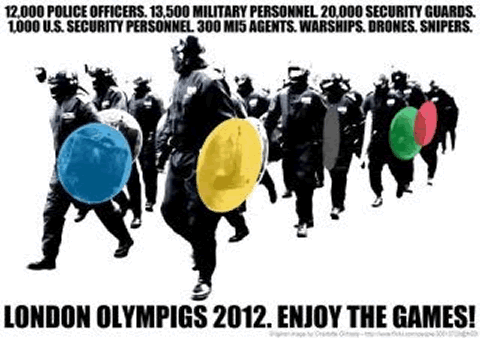
De Olympische Spelen in London beloven opnieuw een financieel record te breken. De teller staat nu op een hallucinante 29 miljard euro, vergelijkbaar met de kostprijs voor Peking 2008. Een bedrag dat zo goed als volledig (98 procent) wordt betaald door de belastingbetaler. De economische crisis geldt duidelijk niet voor megalomane prestigeprojecten.
Een grote hap van het olympisch budget gaat steevast naar de zogenaamde security measures. Ook daarbij worden om de vier jaar weer alle records gebroken. De 1,7 miljard dollar die in 2004 werden uitgegeven voor beveiliging in Athene, was al het viervoud van het bedrag dat in 2000 in Sydney werd besteed aan beveiliging. In 2008 steeg dat bedrag naar 6,5 miljard dollar voor de Spelen in het Chinese Bejing. Voor London is het kostenplaatje nog niet helemaal rond, maar nu al staat vast dat ook hier de Olympische beveiliging booming business is.
The 10,500 athletes participating in the London Olympic and Paralympic Games, the world’s greatest celebration of human physical endeavour and progress, will be guarded by a security force of some 40,000. This beats the 3:1 ratio of guards to athletes at the 2010 Vancouver Winter Olympics, as the London Games continues the Olympian trend for record-breaking security contingencies. Indeed the home secretary, Theresa May, only last month crowed that the Games’ security would constitute “the UK’s largest ever peacetime logistical operation”. Never mind the performance of athletes: the Olympics is about government and business delivering security solutions. – Robin Tudge in the Guardian
Meanwhile, installed gadgetry always finds other uses. CCTV set up to monitor traffic during the Athens Games were later used to monitor public gatherings. In addition, a communications system set up to co-ordinate the Greek emergency services has, at great cost, been expanded into a surveillance command system dealing with “Greek post-Olympic security needs”, presumably in great use now in the bankrupt land where the Games were born.
Meer:

